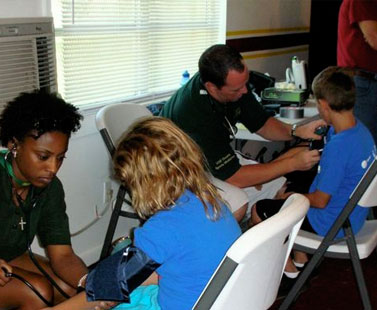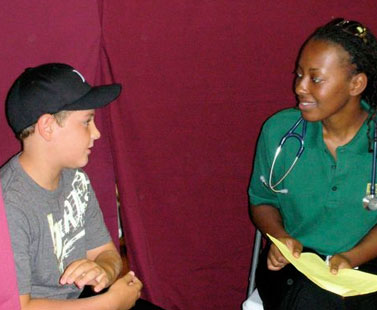SMART & USF Health Pediatrics team up with familiar redhead to help kids

It was an early start for the USF Health team of pediatricians and health professionals in Seffner on June 23rd. Parents and children of all ages turned out to the Antioch Redskins Facility, near Plant City, to get free “physicals”. The big draw: the redhead in the clown suit! Ronald McDonald is still King with the kids! No doubt about it!
“This was a fabulous opportunity to help out so many appreciative people”, said Jeff Konin, PhD, Executive Director of Sports Medicine & Athletic Related Trauma (S.M.A.R.T.) Institute at USF Health. Since January 2006, the Department of Pediatrics in the University of South Florida’s College of Medicine has been home to one of only 29 Ronald McDonald Care Mobiles in operation worldwide. It’s a distinction and responsibility, they don’t take lightly. Jeannette Fleischer, ARNP, is the Program Director. Dr. Lynn Ringenberg is the Medical Director. Both have worked hard to “grow it” and seventeen months later, the program is definitely in bloom!
“This (June 23rd) was the first time we’ve worked with S.M.A.R.T. members and it’s really great having them involved”, said Dr. Ringenberg. “They (S.M.A.R.T. faculty) do a comprehensive examination of the musculoskeletal system and vital signs- which frees up our doctors to do the remainder of the examination. It allowed us to see many more kids, much more efficiently.” In four hours, they saw approximately 85 children.


Combining the sports medicine and orthopedic expertise of faculty from S.M.A.R.T. created shorter wait times too. Children of all ages were examined from head-to-toe, including a “pre-participation physical examination”, and a check of heart, lungs, abdominal, hernia and more.
“The program strives to identify, treat and refer children with chronic or untreated health conditions, improve health outcomes, provide continuity of care, educated children and families, and screen and enroll eligible families in federal Medicaid or state insurance programs”, explains Dr. Ringenberg. “The USF Pediatrics Mobile Health Program also serves as a venue for training graduate medical residents to better care for underserved children, children with special needs and high-risk youth.” Last year, 70 USF Pediatric and Internal Medicine-Pediatric graduate medical residents participated in the mobile health visits that take place at 59 Title 1 schools throughout Hillsborough and Pasco counties. Title 1 schools are primarily located in underserved communities where a majority of the students qualify for free and reduced lunch.
“The service of providing pre-participation physical exams to underserved children in our community via the Ronald McDonald van exemplifies the model of inter-professional collaboration we have at USF Health”, said Barbara Morris, Assistant Program Director of S.M.A.R.T. “The June 23rd event showcases the working relationship between our pediatrics and S.M.A.R.T. athletic trainers from USF’s Department of Orthopaedic Surgery. In this interaction across departments and professions, the real winners are the kids of Tampa Bay.”
The 40 foot medical and dental office on wheels has a home at USF Health Pediatrics thanks to a collaborative relationship with Ronald McDonald House Charities of Tampa Bay. To keep it here, USF Health Pediatrics must raise $250,000 each year to cover operational expenses. Inspired by the number of kids they’ve served- approximately 1,500 since 2006 – the pediatrics team is “out on the van” five days a week on most weeks, except for school holidays. When school is out, they visit year round community facilities like Joshua House, The Spring, as well as school fairs and sporting events. Fundraising involves grant writing, contributions from foundations and individual donors. “One of the major challenges for a mobile access program is to sustain it. We’re constantly looking at ways to keep this mobile clinic for our children in Tampa Bay”, said Dr. Ringenberg. More than 50 per cent of the kids they see in the mobile unit are un-insured – their efforts in the Ronald McDonald Care Mobile are families’ only alternative to seeing a doctor at a hospital emergency room. See “Success Stories” below photo gallery.
The program has garnered national attention for what it achieves academically, as well. USF Health Pediatricians have presented at national meetings at the request of the American Academy of Pediatrics. “Our care mobile is academically focused with the intent not only to provide the highest level of health care, but to ensure that pediatric residents, medical students and nursing students are actively engaged in providing care on the mobile clinic. We are determined to have these students experience the unique environment of a mobile health care setting and gain a better understanding of the lack of health care access and other health disparities problematic to this population”, said Dr. Ringenberg.
For more information on upcoming visits by the Ronald McDonald Care Mobile or information on how to contribute to this program, click here
or contact (813) 259-8754.
Story by Lissette Campos
Photo Gallery Below.




SUCCESS STORIES FROM THE RONALD McDONALD CARE MOBILE
Since USF Health’s Pediatrics Department received the Ronald McDonald Care Mobile January 13, 2006, they’ve served more than 1500 children across 14 different regions of Hillsborough and Pasco County- among them Plant City, Thonotosassa, East Lake, Sulphur Springs, and Palm River. What happens inside the Care Mobile is just part of the story. The 1:1 visits with pediatricians and residents from the USF College of Medicine have been especially critical for children who had undiagnosed illnesses until their visit to the care mobile. In other cases, acute health issues were caught “just in time”.
Below are just a few of the stories shared with us by the pediatrics team involved with the Ronald McDonald Care Mobile program.
• A mother came to the van with her 13 year old child and husband requesting help for her child who has developmental issues. While the husband waited outside, the mother, who is Spanish speaking only, broke down and informed the nurse practitioner through an interpreter that she was “being abused by her husband”. After evaluating the child, the mother was given the phone number for The Spring, a domestic violence shelter in Tampa. After evaluating the child, and making recommendations, the mother left the van. We saw the mother with her child 2 weeks later when the USF Pediatric Ronald McDonald Care Mobile visited The Spring. She hugged everyone crying and thanking the van team for providing the information about The Spring. She reported that after seeing us on the van her husband again beat her. The police were involved and she made her way to The Spring, where she now feels safe. This woman could still be in an abusive relationship if the van not been at that particular school to provide care and information. Her child is now being followed by a school psychologist and doing ok.
• A 17 year old female student was evaluated on the Care Mobile for a sports physical. The student appeared very thin and sad and would not make eye contact with the provider. She would not freely talk to the provider and would only answer the provider’s questions in very few words. The provider noted that the student had a speech deficit and was unable to articulate clearly. The school nurse mentioned to the provider that the student had suffered an accident to her mouth five months ago and broken all her front teeth. She had been treated at an emergency room and given a referral to a dentist. Her mother mentioned to the provider that the dentist had charged her a lot of money to provide a prosthesis but she was still very upset about her appearance and her inability to talk clearly. Mom also said that her daughter had lost a lot of weight and was not interacting with any of her friends. The school nurse had referred the student to the school psychologist for depression and weight loss. The mom stated she had no health or dental insurance at the time. The student was then referred to a periodontal dentist who volunteered to examine the student and evaluate her dental condition. The student was seen by the periodontal dentist for two visits. The periodontal dentist replaced her prosthesis and suggested that she needed further evaluation by an oral surgeon in the future. The student was very pleased that she looked better & could talk better.
• A 14 year old at a middle school had been treated for hypertension with a medication but then lost his funding and was taking his grandmother’s medication intermittently for over a year. The school nurse called the Care Mobile asking for some help. The Care Mobile Program was able to evaluate the student and write a prescription for the medication the student was previously on and then find funding to pay for the prescription. Additionally, the van team helped the parent apply for further health care funding.
• Two female adolescents were evaluated on the Care Mobile for chronic abdominal pain. They were both found to have chronic pelvic inflammatory disease, which can lead to serious complications, to include sterility, if not properly treated. One of the students required hospitalization and then surgery. The other student was evaluated and treated by an adolescent pediatrician. Both students had funding but no access to a physician. The Care Mobile provided the needed access!
• An athletic 16 year old male who had such a painful knee that he was unable to participate in sports or even walk much. He had been using a knee brace to walk around school for over a year. The student was unaware of his funding status. The student was evaluated on the Care Mobile and his parent contacted. The student had funding so he was referred for knee x-rays and an orthopedic evaluation. He is no longer using the knee brace and participating fully in sport activities. Without this attentive care, his knee injury may have resulted in permanent damage.
• An 11 year old student was referred to the Care Mobile because of a chronic cough described as “barking”. The student had been seen by his pediatrician several times without any change in the student’s condition. The mother was very concerned and asked if the child could be evaluated on the Care Mobile. The student was evaluated and then because the student had funding, the student was referred to a pediatric ear, nose and throat doctor that day. The student’s coughing resolved and he is doing well.

